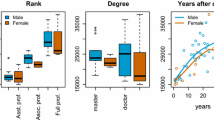Abstract
Services in the information society allow automatically and routinely collecting large amounts of data. Those data are often used to train classification rules in view of making automated decisions, like loan granting/denial, insurance premium computation, etc. If the training datasets are biased in what regards sensitive attributes like gender, race, religion, etc., discriminatory decisions may ensue. Direct discrimination occurs when decisions are made based on biased sensitive attributes. Indirect discrimination occurs when decisions are made based on non-sensitive attributes which are strongly correlated with biased sensitive attributes. This paper discusses how to clean training datasets and outsourced datasets in such a way that legitimate classification rules can still be extracted but indirectly discriminating rules cannot.
Access this chapter
Tax calculation will be finalised at checkout
Purchases are for personal use only
Preview
Unable to display preview. Download preview PDF.
Similar content being viewed by others
References
Pedreschi, D., Ruggieri, S., Turini, F.: Discrimination-aware data mining. In: Proc. of the 14th ACM International Conference on Knowledge Discovery and Data Mining (KDD 2008), pp. 560–568. ACM, New York (2008)
Kamiran, F., Calders, T.: Classification without discrimination. In: Proc. of the 2nd IEEE International Conference on Computer, Control and Communication (IC4 2009). IEEE, Los Alamitos (2009)
Ruggieri, S., Pedreschi, D., Turini, F.: Data mining for discrimination discovery. ACM Transactions on Knowledge Discovery from Data 4(2) Article 9 (2010)
Pedreschi, D., Ruggieri, S., Turini, F.: Measuring discrimination in socially-sensitive decision records. In: Proc. of the 9th SIAM Data Mining Conference (SDM 2009), pp. 581–592. SIAM, Philadelphia (2009)
Kamiran, F., Calders, T.: Classification with No Discrimination by Preferential Sampling. In: Proc. of the 19th Machine Learning Conference of Belgium and, The Netherlands (2010)
Calders, T., Verwer, S.: Three naive Bayes approaches for discrimination-free classification. Data Mining and Knowledge Discovery 21(2), 277–292 (2010)
Pedreschi, D., Ruggieri, S., Turini, F.: Integrating induction and deduction for finding evidence of discrimination. In: Proc. of the 12th ACM International Conference on Artificial Intelligence and Law (ICAIL 2009), pp. 157–166. ACM, New York (2009)
Verykios, V., Gkoulalas-Divanis, A.: A survey of association rule hiding methods for privacy. In: Aggarwal, C.C., Yu, P.S. (eds.) Privacy- Preserving Data Mining: Models and Algorithms. Springer, Heidelberg (2008)
Agrawal, R., Srikant, R.: Fast algorithms for mining association rules in large databases. In: Proc. of the 20th International Conference on Very Large Data Bases, pp. 487–499. VLDB (1994)
Hajian, S., Domingo-Ferrer, J., Martínez-Ballesté, A.: Discrimination prevention in data mining for intrustion and crime detection. In: Proc. of the IEEE Symposium on Computational Intelligence in Cyber Security (CICS 2011), pp. 47–54. IEEE, Los Alamitos (2011)
Hajian, S., Domingo-Ferrer, J., Martínez-Ballesté, A.: Rule generalization and protection for discrimination prevention in data mining (submitted)
Newman, D.J., Hettich, S., Blake, C.L., Merz, C.J.: UCI repository of machine learning databases (1998), http://archive.ics.uci.edu/ml
Author information
Authors and Affiliations
Editor information
Editors and Affiliations
Rights and permissions
Copyright information
© 2011 Springer-Verlag Berlin Heidelberg
About this paper
Cite this paper
Hajian, S., Domingo-Ferrer, J., Martínez-Ballesté, A. (2011). Rule Protection for Indirect Discrimination Prevention in Data Mining. In: Torra, V., Narakawa, Y., Yin, J., Long, J. (eds) Modeling Decision for Artificial Intelligence. MDAI 2011. Lecture Notes in Computer Science(), vol 6820. Springer, Berlin, Heidelberg. https://doi.org/10.1007/978-3-642-22589-5_20
Download citation
DOI: https://doi.org/10.1007/978-3-642-22589-5_20
Publisher Name: Springer, Berlin, Heidelberg
Print ISBN: 978-3-642-22588-8
Online ISBN: 978-3-642-22589-5
eBook Packages: Computer ScienceComputer Science (R0)




